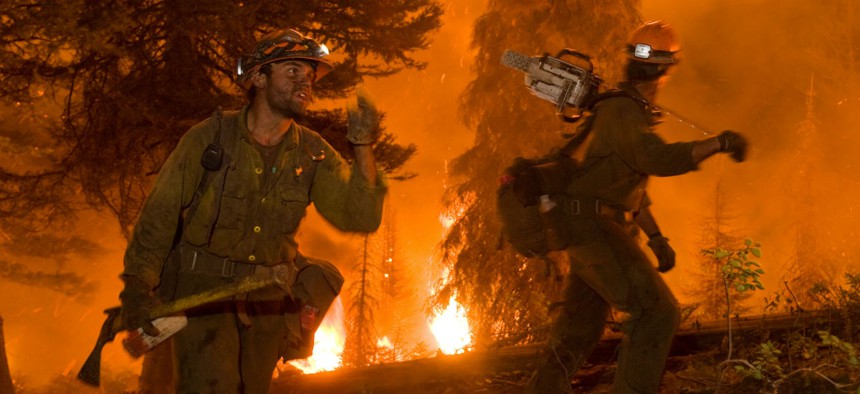
Kari Greer/U.S. Forest Service file photo
Wildfire Crisis Engulfs the Rest of the Forest Service's Budget
Agency chief wants an emergency reserve fund to fight catastrophic fires.
Deadly wildfires swept across America last summer, inflicting loss of life along with massive property damage and costing the federal government over a billion dollars to stamp out the flames.
This summer's wildfire season could be even worse—and it very likely will break the bank.
Bone-dry conditions in the West put vast stretches of California, Oregon, and Washington at risk for devastating wildfires. The U.S. Forest Service predicts that it could spend as much as $1.6 billion fighting fires this year.
Over the past decade, wildfires have grown larger and more severe. A changing climate, intense drought, property development near parks and forests, and a build up of quick-to-ignite forest debris have all contributed to a new normal of costly and difficult-to-contain wildfires.
As the Forest Service spends lavishly to fight fires, it has increasingly been forced to dip into funds set aside for other projects. Just a handful of catastrophic wildfires this year could result in significantly less money left over for fire prevention and an array of services such as maintaining roads and trails in national parks.
"This issue is absolutely vitally important," Agriculture Department Undersecretary for Natural Resources and Environment Robert Bonnie said in an interview. "It's not just a crisis when they happen in the West. The budget impacts that result from fire being fought affect all of the forest-service programs across the country."
As a result, the cash-strapped service is looking to Capitol Hill for help.
Forest Service Chief Tom Tidwell pleaded his case before the Senate Energy and Natural Resources Committee in May, telling the panel that catastrophic wildfires should be funded like natural disasters and paid for out of a separate pot of money set aside by Congress that would function as an emergency reserve fund.
Tidwell is expected to make the same appeal when he testifies before a House Natural Resources subcommittee Wednesday for a hearing on forest management and wildfire prevention.
Even in a bitterly-divided Congress, Democrats and Republicans agree that a problem exists.
"The current system is not working the way it should," Republican Sen. John Barrasso of Wyoming said in the Capitol on Tuesday. "We worry about every upcoming wildfire season. We're really not comfortable until the first snow comes."
"Wildfires are getting more expensive to fight and the number of acres that are burned just keeps going up. We don't think there's any more time to just play the same old status quo hand while the Forest Service chokes," Democratic Sen. Ron Wyden of Oregon said in an interview.
Legislation sponsored by Wyden and Republican Sen. Mike Crapo of Idaho would end the service's cycle of borrowing money from other funds to cover the cost of fighting wildfires. It would set up a separate disaster account that would pay for efforts to put out the worst and most devastating fires.
The push has won support from environmentalists and conservative groups alike.
A diverse coalition of organizations applauded the legislation in a letter last month. Groups that signed on to applaud the measure ranged from the National Rifle Association to the Sierra Club and the Nature Conservancy.
Republican Sens. John McCain and Jeff Flake of Arizona joined Barrasso in introducing legislation that changes the way the service funds firefighting. The bill, however, would go a step further by prompting efforts to thin forests, a measure that many Republicans say must be a priority in any attempt to bring wildfires under control.
A House Natural Resources Committee subcommittee Wednesday will consider a discussion draft of legislation that similarly prioritizes forest management as a way to curb wildfires and includes provisions to speed removal of dead trees from forests.
Despite the slight difference in emphasis between the bills, funding-reform advocates are hopeful that Congress may set up a wildfire disaster fund soon.
"We're closer to agreement than we ever have been in the past," said Cecilia Clavet, a senior policy adviser for the Nature Conservancy. "There are several proposals out there, all of which seek disaster funding, so that's a really great step."
"Congress and staff up on the Hill have all come to this realization that we have a serious problem," Bonnie said. "We've finally put the bell on the tiger here in the sense that we've actually shown by looking at the forest-service budget that we can point to these trends over time."
Stephanie Stamm contributed to this article.
NEXT STORY: Obama’s Red Line on Iraq: No Ground Troops








